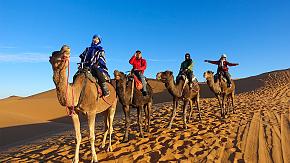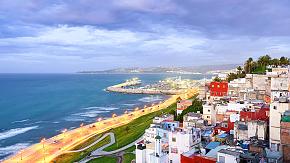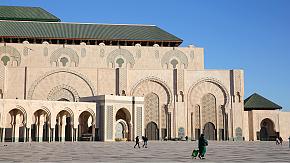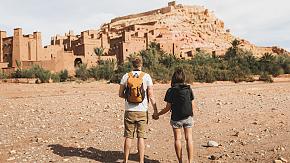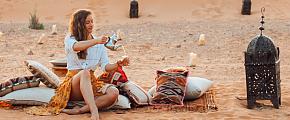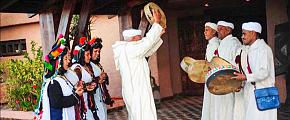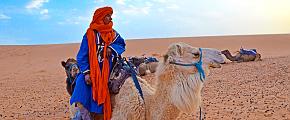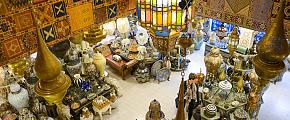Top 10 Things NOT to Do in Morocco 2026
Morocco is an alluring country that provides tourists with spectacular nature and all manner of cultural experiences, including wandering about its bustling souks and sampling local delicacies. However, Morocco has quite a different religion and practices from those in Western culture. It is essential to do certain things right and follow some cultural traditions in the country. Today we enumerate a top ten list of don'ts for you when traveling in Morocco to ensure a smooth and enjoyable trip. Here are:
- Disrespect rules when viewing mosques
- Eat food with your left hand
- Show your shoulders and knees
- Take pictures of locals without permission
- Leave Morocco without trying mint tea
- Disrespect the King of Morocco
- Buy something in the souks without haggling
- Get a henna tattoo in the market or on the street
- Drink the tap water
- Eat in public during fasting hours
Disrespect rules when viewing mosques
It is estimated that over 90 percent of the population believes in Islam. As such, there is a large number of mosques and shrines for Muslim worship of Allah and social activities. Except for Hassan II Mosque, most of the mosques in Morocco are closed to non-Muslims. So you should not enter mosques but enjoy the view from the outside if you don't practice Islam and should be mindful of your actions and words when visiting such religious sites. To keep with Islamic customs, it is advisable to clean your hands and face and take off your shoes before entering certain mosques.
Eat food with your left hand
Most Moroccan dishes, especially Muslim ones, are required to be eaten with hands. Locals, though, use only their right hand to eat. The right hand is traditionally thought to be more propitious than the left, which is considered filthy because Muslims wipe them clean and do their dirty work with the left hand. Muslims get their things done with the right hand and the right foot to expect a good result. So keep in mind to not use your left hand to eat when you're having contact with locals. Using the left hand may be seen as bad manners and even an insult in Islam. But if you have done so negligently, you might receive a few frowns from local faces or incur a few pouts and glares.
Show your shoulders and knees
Though Muslims in Morocco are relatively open to tourists, the religion still sets strict limits on the way people dress. Showing too much skin, especially on the shoulders and knees, is considered unclean and obscene. It is important to respect and follow local customs and rules when you visit the country, particularly one of its mosques or shrines. Both females and males should avoid tank tops, while wearing shorts for a man is permissible. Females should wear shirts with a sleeve covering the shoulders and skirts below the knees when visiting mosques, markets, or other public areas. See-through blouses, excessively short garments, and camisole dresses are forbidden. You can prepare a couple of thin long-sleeved jackets for fear of hot sunshine. It should be noted that it is only acceptable to show your shoulders in Marrakesh, a bustling city in southern Morocco. Anyway, for both men and women, it is respectful to dress conservatively in public areas.
Take pictures of locals and their merchandise without permission
It may be irresistible to snap a photo of a new place. It's quite common to capture the beauties of nature with your smartphone and camera. But it must be noted that not everything is allowed to be deservedly photographed in Morocco. Many Moroccans are friendly and open to tourists, but they might take offense if you take pictures of them and their shops without asking permission. It's important to respect their privacy. Always ask first before taking a photo of locals or their products, and be understanding if they decline. Sometimes you may be asked for a little cash, usually 5-10 dirhams (1.5-3 USD), in compensation for their being photographed.
Leave Morocco without trying mint tea
Moroccans drinking mint tea can be traced back to the 19th century. Drinking mint tea is now an integral part of people's lives in Morocco and its surrounding countries, like Egypt and Algeria. Moroccan mint tea is mixed with Chinese gunpowder tea, sprigs of fresh mint, and sugar. It has a refreshing flavor and is an ideal summer drink to relieve the heat and pick you up. Mint tea is an important way to show Moroccan hospitality and respect for their guests. So, before you leave Morocco, it's respectful to try this national drink in addition to couscous, the national dish of the country. You can head to the local cafes and order a cup, relaxingly sitting down to experience a part of local life.
Disrespect the King of Morocco
Morocco is a constitutional monarchy where the king takes on the mantle of supreme power. Morocco's kings of different periods have made significant achievements in widening borders, defending national sovereignty, and resisting the enemy's invasion, with the result that the king plays an important role in the Moroccan public. It must be mindful to avoid lese-majesty, an offense against the dignity of the ruling head of Morocco. Any disrespect for the king, including mocking, criticizing, or maligning it, is not permissible. This behavior may be classified as a criminal offense and even lead to a jail sentence of up to three years. The practice of caricaturing the king's image is also forbidden. Anyhow, you should respect the Moroccan king and thus have a carefree trip.
Buy something in the souks without haggling
Haggling is a common practice in trade in Morocco, especially in some souks and markets. Moroccans have a tradition of bargaining for merchandise and travel prices, and they call this "push push". The price of most products at the markets is artificially high, and vendors often expect tourists to negotiate prices. It may be challenging and uncomfortable at first for you to bargain for a favored item, but haggling would bring you a good product at a reasonable price that may be less than half of the original one. The tactic of turning around and leaving may work to make vendors compromise if you fail to reach an agreement on the price. Be mindful not to be eager to buy the things you like but shop around for the best deal if you have plenty of time.
Get a henna tattoo in the market or on the street
If you travel around the main souks and streets of Marrakech and other major cities, you will find lots of females of different ages with special tattoos on their hands or wrists. This kind of skin art is referred to as henna tattoos, one of the unique forms of traditional Moroccan tattoos. Generally, henna tattoos are made from a kind of near-Mediterranean plant with water and do no harm to the human body. But if you really want to have such a tattoo on your hands, go to a formal tattoo shop. You will find a lot of women providing tourists with their tattoo services in the squares and on the streets. Some of them will use dangerous ingredients like gasoline and hazardous chemicals that are harmful to your skin. Some may even cause skin rashes and blood poisoning. What's more, such an information service as tattooing is quite expensive.
Drink the tap water
Despite great headway with the water source in Morocco, it is not absolutely certain to drink the local tap water safely. You may find most Moroccans drink tap water with no harm. However, it's still risky for you to drink the local tap water no matter how strong you have stomach though the water is chlorinated in many large cities in the country. Such attempts may cause diarrhea or sickness. It is essential to purify such tap water or choose another water supply. You can choose filtered or bottled water, hot drinks, or other packaged beverages during your journey in Morocco. Some produce and street food may be irrigated or made with tap water, so try not to eat raw vegetables, unpeeled fruits, and drinks with ice but eat cooked foods and drink hot water as much as possible.
Eat in public during fasting hours
Ramadan is a very significant event in the Muslim calendar. It is a holy month, running typically from May to June every year. During this time, Muslims, except for old folks, kids, patients, and pregnant women, give up eating, drinking, and smoking from sunrise to sunset. During the fasting hours, even non-Muslims are expected to observe some fasting rules. To avoid unwanted murmurs, it's important to respect the tradition of not eating, drinking, or smoking in public during the fasting day. But as a non-Muslim, you are allowed to do these things privately.
Having learned about the things to avoid mentioned above, do you have a basic knowledge of Morocco and its culture? Morocco boasts beauties of nature and a wealth of historical sites, not to mention its bustling markets and souks. Getting to know some things not to do ahead may smooth or facilitate your visiting every aspect of the country. We hope you can benefit greatly from our travel tips and then be well-prepared for your trip. If you would like to learn more don'ts and dos about Morocco, keep in touch with Odynovo. For a better individual experience, we work to make a customized itinerary based on your needs and preferences. We will offer you a unique experience that will leave you with lasting memories of this amazing country.
What Our Clients Say
Explore the latest verified reviews of Odynovo's travel services on Tripadvisor, Google, Trustpilot, Product Review and more trusted platforms.

